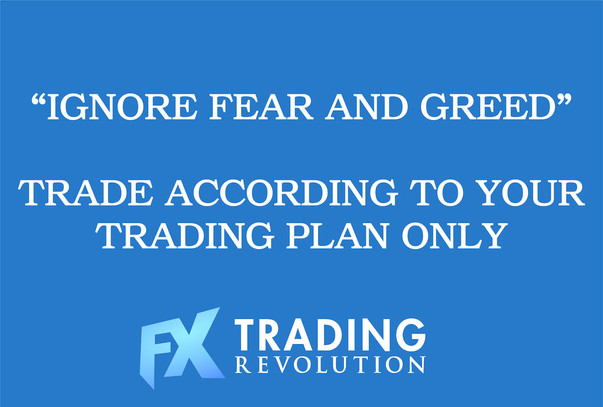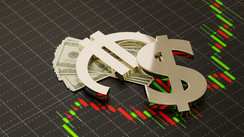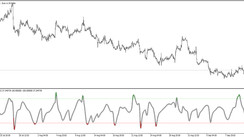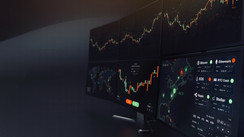Trading psychology is a term frequently used in Forex trading to describe traders’ perceptions of the market while being in the heat of the action trading it.
Usually, it comes down to the moment in trading when you cannot decide between continuing to hold a trade at the risk of losing the money you’ve already won or even losing more than the currently achieved profit, and taking your profits by closing the trade, even if it means gaining mediocre profits.
Traders who are afraid of losing the money they’ve won after the trade moves in their favor, who lack experience or simply have an insatiable appetite for winning often allow their emotions to rule over rational trading, usually resulting in unnecessary and drastic losses.
This is not the way to trade the Forex market and it definitely is not a profitable one.
Learn to keep a distance between your trading plan and emotional outbursts
Many organizations providing education on trading Forex ignore the most important aspect of the market – the human nature.
You can also find entry and exit signals, support and resistance lines, which can all be of good use to make effective decisions in the trading process. Just about any Forex website publishes the necessary data for a trader to be able to win in the Forex market, with squillion of news, interviews, forecasts, and opinions.
No doubt that all these features impress novice traders during the first steps of their journey, however, it is when you realize the importance of having a trading plan for every trading session you are going to trade, that you learn to distance yourself from your emotions.
You become familiar with the feelings of doubt and fear when the market moves against you after opening the position and you learn to stick with the plan during those times. If you have no plan for a trade it’s much easier to fall victim to emotions.
It appears that the phrase “if you fail to plan you plan to fail” is so true and so important in Forex trading.
Are you upset?
While you are watching the market moving against your analysis and against all logic, your emotions start to push you to completely reverse your initially chosen trades, leading to ignoring your own trading plan and strategy that you’ve built in advance.
On the other hand, all your educational materials, videos, and colleagues insist with one accord on the paramount role of a trading plan – and you cannot get rid of this axiom.

To be a successful trader, a real professional, one needs to learn to listen to their “inner self” – their unconsciousness.
Our mind is able to keep an immense amount of data. We use our five senses at all times, whether consciously or unconsciously. While our unconscious mind works on all aspects of our life at all times, the conscious mind has a limited capacity and is able to focus on only a few things at the same time. Solving common day-to-day tasks, making a choice between two or more options and analyzing the market are all activities undertaken by the conscious mind.
As we are trading and building experience, all our past experiences are stored deep in our unconscious mind and over time they slowly build up into something that some people call an “invisible analyst”, and others – the sixth sense.
Novices don’t have enough emotional experience yet and cannot feel when something is connected with the market processes, hence they are recommended, first of all, to rely on the mechanisms of a trading plan.
In order to that one needs to build a trading plan. So, first, give yourself time to study the art of chart interpretation, prepare for work by studying the economic calendar and its data in advance, and finally, learn to build an extensive trading plan.
After a trading decision has been taken based on the trading plan, don’t change it no matter what happens. During this learning process, you should act like a robot implementing your trading strategy. There should be no place for your emotions here. Of course, for new traders, it’s best to first practice this on a demo account and only if the trading plan is profitable, then it can be traded on a live account.
On the way of your development as a trader, with time, your “invisible analyst” will start to regulate your trading decisions, by being present and effortlessly taking part in the process.
Until then, it’s useful to create a separate space for emotions that will help you to feel the market while combining the rational components as well. Using emotions in the trading process in doses, but not mixing them with the logical analysis of the market, demonstrates professionalism and over time helps in achieving optimal trading results.
The Role of Trading Psychology in Forex trading
Trading psychology plays an important role in achieving long-term success in Forex trading. Though the lack of market knowledge, a bad trading system, bad forex trading services or the wrong forex broker can all contribute to one's trading failures, the most fundamental attribute of frequent losses is usually the result of two specific emotions: fear and greed.
Fear vs. Greed
Individuals who trade on fear will either close a trade in haste or avoid making a trade when the opportunity is there. After a series of losses, the usual effect is a loss of confidence, which usually leads to traders selling themselves short when the potential to earn big is at their fingertips.
When trading with the emotions of fear, opportunities go amiss all too often, making it difficult to trade confidently or successfully.

Those who trade on greed usually go in too deep when they simply cannot afford to take the risk. Although there may have been a period where their forex trading account was seriously profiting, after some time, making big, aggressive trades eventually leads to monumental financial losses.
Traders of this nature should learn to appreciate a moderate profit, instead of allowing greed to possess their decision making during the trading process.
Characteristics of a Successful Trader
It is very easy to get carried away on emotions, which is why a solid forex trading strategy, strict discipline towards your trades and the implementation of risk management (such as stop loss and take profit orders) all contribute to more articulated, controlled trading.
Finally, if you intend to become a long-term, steady trader it is necessary to ensure that your personality is suited for this fast-paced and dynamic industry.
Below are some of the characteristics attributed to successful traders:
- The ability to comprehend the bigger picture
- A systematic, organized approach to trading
- The aptitude to make accurate trading decisions quickly
- Using analytical skills combined with logic to place successful trades





